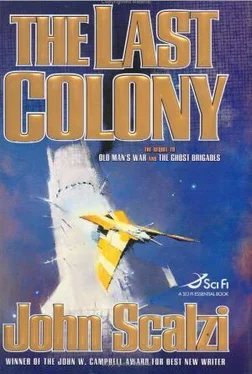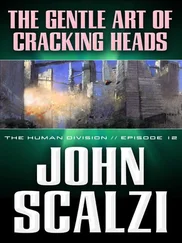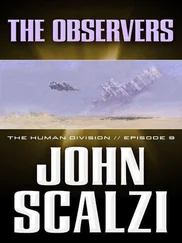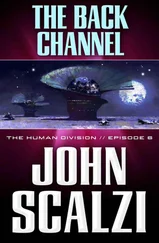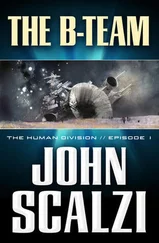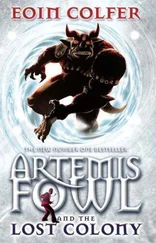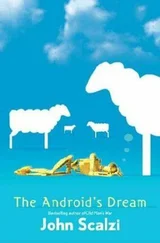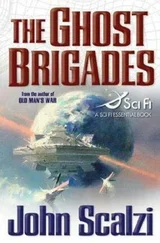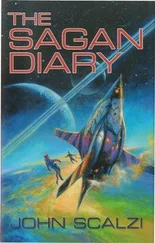"I remember," I said. And I did remember; Vikram Banerje, who had been an astronomer back on Earth, had been a frequent visitor to our house in our first years in New Goa, patiently tracing out the patterns in the sky for Jane. He died not too long after he finally taught her all the Huckleberry constellations.
"I didn't see them at first," Jane said.
"The constellations?" I asked.
Jane nodded. "Vikram would point them out to me, and I'd just see a clump of stars," she said. "He'd show me a map and I'd see how the stars were supposed to connect together, and then I'd look up at the sky and just see… stars. And it was like that for a long time. And then one night, I remember walking home from work and looking up and saying to myself 'there's the crane,' and seeing it. Seeing the crane. Seeing the constellations. That's when I knew this place was my home. That's when I knew I had come here to stay. That this place was my place."
I slid my arms down Jane's body and held her around the waist.
"But this place isn't your place, is it?" Jane asked.
"My place is where you are," I said.
"You know what I mean," Jane said.
"I know what you mean," I said. "I like it here, Jane. I like the people. I like our life."
"But," Jane said.
I shrugged.
Jane felt it. "That's what I thought," she said.
"I'm not unhappy," I said.
"I didn't say you were," Jane said. "And I know you're not unhappy with me or Zoe. If General Rybicki hadn't shown up, I don't think you would have noticed that you're ready to move on."
I nodded and kissed the back of her head. She was right about that.
"I talked to Zoe about it," Jane said.
"What did she have to say about it?" I asked.
"She's like you," Jane said. "She likes it here, but this isn't her home. She likes the idea of going to a colony that's just starting out."
"It appeals to her sense of adventure," I said.
"Maybe," Jane said. "There's not a lot of adventure here. That's one thing I like about it."
"That's funny coming from a Special Forces soldier," I said.
"I say it because I am Special Forces," Jane said. "I had nine years of nonstop adventure. I was born into it and if it wasn't for you and Zoe I would have died in it, and not had anything else. Adventure is overrated."
"But you're thinking of having some more anyway," I said.
"Because you are," Jane said.
"We haven't decided anything," I said. "We could say no. This is your place."
"'My place is where you are,'" Jane said, echoing me. "This is my place. But maybe somewhere else could be, too. I've only had this one place. Maybe I'm just frightened of leaving it."
"I don't think you're frightened by much," I said.
"I'm frightened by different things than you are," Jane said. "You don't notice because sometimes you're not too observant."
"Thanks," I said. We stood there in the road, entwined.
"We can always come back," Jane said, eventually.
"Yes," I said. "If you want."
"We'll see," Jane said. She leaned back to kiss my cheek, untangled herself from my grasp and began to walk down the road. I turned back toward the house.
"Stay with me," Jane said.
"All right," I said. "I'm sorry. I thought you wanted to be by yourself."
"No," Jane said. "Walk with me. Let me show you my constellations. We have time enough for that."
The Junipero Sena skipped and suddenly a green and blue world hovered large outside the window of the Serra's observation theater. In the seats, a couple hundred invited guests, ^m reporters and Department of Colonization officials oohed and aahed as if they'd never seen a planet from the outside before.
"Ladies and gentlemen," said Karin Bell, Secretary of Colonization, "the new colony world of Roanoke." The room burst into applause, which faded into the hiss of reporters quickly whispering notes into recorders. In doing so most of them missed the sudden appearance in the middle distance of the Bloomington and the Fairbanks, the two CDF cruisers that were accompanying this little press junket in the stars. Their presence suggested to me that Roanoke might not be as entirely domesticated as the Colonial Union would like to suggest; it wouldn't do to have the Secretary of Colonization—not to mention the aforementioned reporters and invited guests—blown out of the sky by some alien raider.
I noted the appearance of the cruiser to Jane with a flick of my eyes; she glanced and nodded almost imperceptibly. Neither of us said anything. We were hoping to get through this entire press thing without having to say anything. We had discovered that neither of us were particularly good with the press.
"Let me give you just a little background on Roanoke," Bell said. "Roanoke has an equatorial diameter of just under thirteen thousand kilometers, which means it's larger than either Earth or Phoenix, but not as large as Zhong Guo, which retains the title the CU's largest colonized planet." This prompted a halfhearted cheer from a couple of Zhong Guo reporters, followed by a laugh. "Its size and composition means the gravity is ten percent heavier here than on Phoenix; most of you will feel like you've put on a kilo or two when you go down. The atmosphere is the usual nitrogen-oxygen mix, but it's unusually heavy on the oxygen: close to thirty percent. You'll feel that, too."
"Who did we take the planet from?" asked one of the reporters.
"I'm not there yet," Bell said, and there was a little grumbling. Bell was apparently known for giving dry press conferences off notes, and she was in fine form here.
The image of Roanoke's globe disappeared, replaced with a delta, in which a small river joined in with a much larger one. "This is where the colony will settle," Bell said. "The smaller river here we've named the Ablemare; the larger one here is the Raleigh. Raleigh drains this entire continent, like the Amazon does back on Earth or the Anasazi does on Phoenix. A couple hundred kilometers to the west"—the image scrolled—"and we're at the Virginian Ocean. Plenty of room to grow."
"Why isn't the colony at the shore?" someone asked.
"Because it doesn't have to be," Bell said. "This isn't the sixteenth century. Our ships are crossing stars, not oceans. We can put colonies in places where it makes sense for them to be. This place"—Bell rewound to the original location—"is far enough inland to be insulated from the cyclones that hit at the mouth of the Raleigh, and has other favorable geological and meteorological advantages as well. Also, the life on this planet has incompatible chemistry to ours. The colonists can't eat anything from here. Fishing is out. It makes more sense to put the colony on an alluvial plain, where it has space to grow its own food, than it does on a coast."
"Can we talk about who we took the planet from yet?" asked the first reporter.
"I'm not there yet," Bell repeated.
"But we know all this stuff already," said someone else. "It's in our press packs. And our viewers are going to want to know who we took the planet from."
"We didn't take the planet from anyone," Bell said, clearly annoyed at being knocked off her pace. "We were given the planet."
"By whom?" asked the first reporter.
"By the Obin," Bell said. This caused a stir. "And I'll be happy to talk about that more, later. But first—" The image of the river delta vanished, replaced by some furry tree-like objects that weren't quite plants, not quite animals, but were the dominant life form on Roanoke. Most of the reporters ignored her, whispering into their recorders about the Obin connection.
"The Obin called it Garsinhir," General Rybicki had said to me and Jane a few days earlier, as we took his personal shuttle from our transport to Phoenix Station for our formal briefing, and to be introduced to some of the colonists who would act as our deputies. "It means seventeenth planet. It was the seventeenth planet they colonized. They're not a very imaginative species."
Читать дальше
